Abstract Detail

Isala Maud
UZCTRC, Zimbabwe
Abstract
Introduction and Background: In ZImbabwe , women contribute the larger number of people living with HIV as compared to their counterparts . From the moment one is diagnosed with HIV in community settings it comes with a lot of challenges as soon as one discloses to family members and the challenges range from stigma and discrimination in the home setting and the community at large, giving rise to an abnormal mental state. Poverty also comes in not because of inability to work but once one discloses their status or it is known most employers are not willing to employ you. Poverty lead to mental stress and trauma as some women are the breadwinners in their families. While it is a noble idea to have an Opportunistic infections centre at local clinic where HIV positive people can collect their anti retroviral medicines this also poses challenges to the HIV positive woman who is supposed to maintain her status without disclosing to anyone but the whole community can see her at the clinic , lining up for her medications and written positive all over the face as you cannot be collecting contraception pills at the Opportunistic Infections clinic. Methods: Group discussions were hell with 2 groups of 30 women in support groups to hear their views on challenges that they are facing as HIV positive women in the society. One on one meetings were also held with some of the women who requested privacy. People also expressed their views on the support group WhatsApp groups. 45 out of the 60 women said they were facing a lot of challenges in the community because of heir status leaving them vulnerable and experiencing mental heath issues. Conclusion and Recommendations: There is so much that communities , healthcare providers and employers need to do in order to support with the challenges being faced by women who are HIV positive to lessen the burden of mental health issues , trauma and other related problems. Employers need to employ these women to enable them to look after their families. Health care providers need to maintain the privacy of HIV positive women to enable them to maintain adherence to ART.
Biography
Maud lsala is a former teacher and now a community paralegal who is a member of the Community Advisory Board (CAB) for the Univimbabwe Clinical Trails Research Centre (UZCTRC), in Harare, Zimbabwe. The CTU is a collaborative program between the University of Zimbabwe and the University of California San Francisco and is officially known as the University of Zimbabwe Clinical Trials Research Centre (UZ-CTRC)
